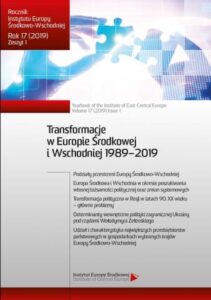ORCID: Renata Duda: 0000-0002-0476-9111
Strony: 143-157
Wydanie: Lublin 2019
DOI: https://doi.org/10.36874/RIESW.2019.1.6
Sposób cytowania: R. Duda, Rola koncepcji «path dependence» w wyjaśnianiu efektywności transformacji w państwach Europy Środkowo-Wschodniej, „Rocznik Instytutu Europy Środkowo-Wschodniej” 17 (2019), z. 1, s. 143-157, DOI: 10.36874/RIESW.2019.1.6.
Słowa kluczowe: EŚW, Europa Środkowo-Wschodnia, political transformation, przejście do demokracji, przekształcenia polityczne, transition countries, tranzycja demokratyczna, zależność od szlaku
Keywords: Central and Eastern Europe (CEE), path dependence, political transformation, transition countries, transition towards democracy
Abstrakt:
The article aims to present the driving forces, defined as the path dependence approach, shaping systemic changes in the Central and Eastern Europe. It will also consider the usefulness of this concept for explaining the different results of the political and economic transformation.
Bibliografia:
Antoszewski A., Współczesne teorie demokracji, Warszawa 2016.
Antoszewski A., Wyboista droga ku demokracji i autorytaryzmowi w świecie pokomunistycznym, „Wrocławskie Studia Politologiczne” 2014, nr 16.
Antoszewski A., Herbut R. (red.), Leksykon Politologii, Wrocław 2004.
Bąk M., Uwarunkowania transformacji gospodarczej w krajach Europy Środkowej i Wschodniej, [w:] G. W. Kołodko, J. Tomkiewicz (red.), 20 lat transformacji, osiągnięcia, problemy perspektywy, Warszawa 2009.
Borisch M. S., Noel M., Private Sector Development During Transition. The Visegrad Countries, „World Bank Discussion Papers” 1996.
Carothers T., The End of the Transition Paradigm, „Journal of Democracy” 2002, vol. 13, no. 1.
Dzionek-Kozłowska J., Transformacja ustrojowa z perspektywy koncepcji path dependence, „Prace Naukowe Uniwersytetu Ekonomicznego we Wrocławiu” 2009, nr 74.
Ekiert G., Eastern Europe’s Postcommunist Transformations, [w:] Democracies Third Wave: Lessons and Legacies, „World Politics Review” 2012.
Ekiert G., Prawidłowości transformacji w Europie Wschodniej, „Studia Socjologiczne” 2011, nr 1.
Ekiert G., Kubik J., Vachudova M. A., Democracy in the Post-Communist World: An Unending Quest?, „East European Politics and Societies” 2007, vol. 21, no. 1.
Havrylyshyn O., Meng X., Tupy M. L., 25 Years of Reforms in Ex-Communist Countries, „Policy Analysis” 2016, no. 795.
Jarmołtowicz W., Piątek D., Strategie transformacji a doświadczenia wybranych krajów. Elementy analizy porównawczej, „Zeszyty Naukowe Polskiego Towarzystwa Ekonomicznego” 2008, nr 6.
Kołodko G. W., Wielka Transformacja 1989–2029. Uwarunkowania, przebieg, przyszłość, „Ekonomista” 2009, nr 3.
Kopecký P., Mudde C., What Has Eastern Europe Taught Us About the Democratisation Literature (and Vice Versa)?, „European Journal of Political Research” 2000, vol. 37, no. 4.
Lijphart A., Democratization and Constitutional Choices in Czecho-Slovakia, Hungary and Poland 1989–91, „Journal of Theoretical Politics” 1992, vol. 4.
Magnin E., Path-Dependence and Initial Conditions in the Transition Process: The Cases of Hungury and Romania, „Journal of Economics and Business” 2002, vol. 5, no. 1.
North D. C., Institutions, Institutional Change and Economic Performance, Cambridge 1990.
Offe C., Drogi transformacji. Doświadczenia wschodnioeuropejskie i wschodnioniemieckie, Warszawa – Kraków 1999.
Pavlínek P., Alternative Theoretical Approaches to Post-Communist Transformations in Central and Eastern Europe, „Acta Slavica Iaponica” 2003, no. 20.
Pawlak A., Polska i węgierska droga do demokracji w perspektywie porównawczej, „Acta Universitatis Lodziensis” 2005, nr 78.
Rustow D., Transitions to Democracy: Toward a Dynamic Model, „Comparative Politics” 1970, vol. 2, no. 3.
Schmitter P. C., Karl T. L., The Conceptual Travels of Transitologists and Consolidologists: How Far to the East Should They Attempt to Go?, „Slavic Review” 1994, vol. 53, no. 1.
Schneider P., Schmitter P. C., Liberalization, Transition and Consolidation: Measuring the Components of Democratization, „Democratization” 2004, vol. 11, no. 5.

PDF: Pobierz